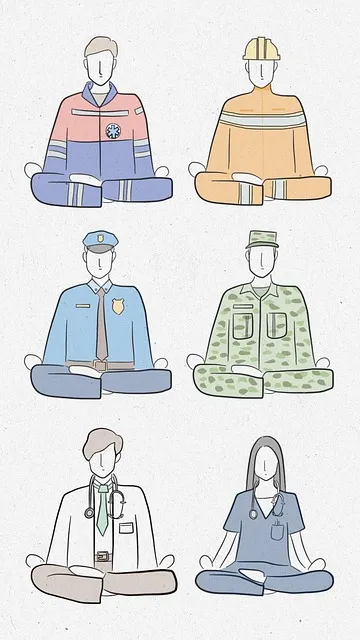Parker Kaiser mental health programs emphasize group facilitation, creating supportive communities where individuals learn from one another, share experiences, and gain insights for improved well-being. Through evidence-based methods like Self-Awareness Exercises and open dialogue, these programs foster stigma reduction, enhance therapeutic outcomes, and support collective mental health. Facilitators build trust and connection using active listening, empathy, and non-judgmental norms, leading to meaningful interactions, genuine relationships, and a sense of belonging. The personalized and adaptable approach ensures everyone feels supported, as seen in their Community Outreach Program using Mind Over Matter principles for dynamic discussions and interactive activities.
Mental wellness group facilitation plays a pivotal role in fostering collective support and enhancing individual well-being. This article delves into the art of leading such groups, offering a comprehensive guide for facilitators inspired by the Parker Kaiser approach. We explore foundational strategies to build trust and connection, ensuring a safe space where members can heal and grow. Additionally, we highlight evidence-based practices tailored to effective group sessions using Parker Kaiser methods. Learn how to adapt facilitation techniques to cater to diverse needs within mental health support groups.
- Understanding Group Facilitation for Mental Wellness: A Foundation for Parker Kaiser Programs
- Building Trust and Connection: Key Techniques to Foster a Supportive Environment
- Evidence-Based Practices for Effective Group Sessions: Engaging Participants with Parker Kaiser Methods
- Adapting and Personalizing Facilitation: Meeting Unique Needs in Mental Health Support Groups
Understanding Group Facilitation for Mental Wellness: A Foundation for Parker Kaiser Programs

Understanding Group Facilitation for Mental Wellness is a cornerstone of Parker Kaiser Programs’ approach to fostering better mental health outcomes. These programs recognize that individuals within supportive communities can learn from one another, share experiences, and gain new insights that contribute to their well-being. A skilled group facilitator plays a pivotal role in creating such environments, where every member feels safe to express themselves openly, build connections, and develop essential coping skills.
Parker Kaiser mental health programs are meticulously designed to address various aspects of mental wellness, including depression prevention and confidence boosting. Through dynamic group facilitation techniques, participants gain practical tools for managing stress, overcoming challenges, and enhancing their overall resilience. This collaborative approach not only facilitates the development of coping skills but also creates a sense of belonging and empowerment, ultimately leading to improved mental health outcomes.
Building Trust and Connection: Key Techniques to Foster a Supportive Environment

Building trust and connection is a cornerstone of effective group facilitation, particularly within mental wellness contexts. Techniques that foster a supportive environment can significantly enhance participants’ willingness to open up, share experiences, and engage in therapeutic activities. Facilitators play a vital role in cultivating a safe space through active listening, empathy, and the creation of non-judgmental norms. This not only encourages individuals to express their thoughts and feelings more freely but also forms the basis for meaningful interactions among group members.
At Parker Kaiser Mental Health Programs, we emphasize compassion cultivation practices as key strategies for building trust. Encouraging open dialogue, validating emotions, and promoting active participation in Coping Skills Development are integral parts of our Community Outreach Program Implementation. By fostering genuine connections, facilitators enable participants to benefit from collective wisdom, offer mutual support, and cultivate a sense of belonging—all essential elements for positive mental wellness outcomes.
Evidence-Based Practices for Effective Group Sessions: Engaging Participants with Parker Kaiser Methods

Group facilitation techniques play a pivotal role in enhancing mental wellness through collective support and shared experiences. Among evidence-based practices, the Parker Kaiser methods stand out for their effectiveness in fostering engaging and impactful group sessions. These innovative mental health programs integrate Self-Awareness Exercises tailored to individual needs, promoting introspection and personal growth. By encouraging open dialogue and active participation, facilitators create a safe space where members can build Confidence Boosting strategies, essential for navigating daily challenges.
Moreover, the Parker Kaiser approach prioritizes Mental Illness Stigma Reduction Efforts by fostering an environment of empathy and understanding. Through interactive activities and reflective discussions, group participants learn to appreciate diverse experiences, breaking down barriers and cultivating a supportive community. This inclusive atmosphere not only enhances therapeutic outcomes but also empowers individuals to actively contribute to their collective mental health journey.
Adapting and Personalizing Facilitation: Meeting Unique Needs in Mental Health Support Groups

In facilitating mental wellness groups, adapting and personalizing techniques to meet unique needs is paramount. The Parker Kaiser Mental Health Programs emphasize this approach, focusing on creating an inclusive environment that resonates with diverse individuals seeking support. Facilitators play a crucial role in tailoring their methods to cater to specific challenges and preferences within the group. This might involve incorporating coping skills development exercises tailored to individual needs, ensuring everyone feels heard and supported.
For instance, the Community Outreach Program Implementation strategy can be adapted to engage various demographics by leveraging Mind Over Matter principles. Through dynamic discussions and interactive activities, facilitators guide members in navigating their mental health journeys, fostering a sense of community and empowerment. This personalized facilitation ensures that each participant receives relevant support, enhancing the overall effectiveness of the group therapy experience.
Group facilitation techniques, as explored through the lens of Parker Kaiser mental health programs, offer a powerful approach to supporting individuals’ mental wellness. By fostering trust, connection, and evidence-based practices, facilitators create safe spaces that encourage engagement and personal growth. Adapting these methods to meet unique needs ensures that support groups effectively address diverse challenges, ultimately enhancing participants’ well-being. Embracing these strategies can revolutionize mental health care, providing a supportive tapestry for those navigating life’s complexities.






